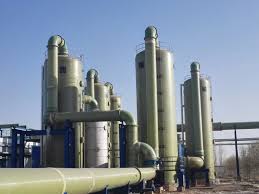Welcome to BAOLAN EP INC.
24-Hour Hotline
- Carbon Capture Utilization
- VOCs series
- DeSOx-DeNOx-Dedust
- Consumables

Contact Baolan

Address: Jurong East Road, Huantai Industrial Park, Zibo City, Shandong Province
Tel: +86-135-8959-1050
E-mail: [email protected]
Tel: +86-135-8959-1050
E-mail: [email protected]
Industry Knowledge
Application prospects of FRP composite materials in desulfurization and anti-corrosion fields
时间: 2025-04-02 15:34
Corrosion hazards are pervasive in daily life and almost all industries, such as metallurgy, chemical engineering, energy, mining, transportation, machinery, aerospace, information, agriculture, food, medicine, marine development, and infras
Corrosion hazards are pervasive in daily life and almost all industries, such as metallurgy, chemical engineering, energy, mining, transportation, machinery, aerospace, information, agriculture, food, medicine, marine development, and infrastructure. The consumption of natural energy and materials due to corrosion is alarming. The losses caused by corrosion in various industries are evident, and the excessive consumption of energy due to corrosion not only results in losses in steel but also directly causes damage to equipment, pipelines, and structures, as well as reducing the efficiency of equipment due to corrosion.


Composite materials based on resin have been used as corrosion-resistant materials in the chemical industry for decades. Due to the high strength of resin-based composites, the absence of electrochemical corrosion, low thermal conductivity, good thermal insulation, and electrical insulation properties, as well as smooth inner walls, low fluid resistance, ease of maintenance, lightweight, and convenient for hoisting and transportation, they have been widely used in industries such as petroleum, fertilizers, salt production, pharmaceuticals, papermaking, seawater desalination, bioengineering, environmental engineering, and metal plating.
Fiberglass composite materials possess corrosion resistance that other materials do not have, and there are significant differences in the corrosion resistance and temperature resistance of fiberglass depending on the selected fibers and resins.
For example, composite components made from ECR-type glass fiber and temperature-resistant phenolic epoxy vinyl ester resin can withstand high temperatures of 180°C and sulfuric acid concentrations up to 70% (the two cannot occur simultaneously), with tensile strength exceeding 500 MPa; however, components made from ordinary unsaturated polyester resin and standard medium-alkali glass fiber materials generally have a maximum operating temperature of 80°C and sulfuric acid concentrations not exceeding 40% (the two cannot occur simultaneously), with tensile strength not exceeding 200 MPa. This shows that due to the differences in selected materials, there will be significant variations in corrosion resistance, temperature resistance, and mechanical properties.
In terms of corrosion resistance, temperature resistance, and mechanical properties, which are closely related to usage conditions and environments, generally speaking, corrosion resistance and temperature resistance mainly depend on the selected resin, while fibers play a secondary role; mechanical properties mainly depend on the fibers, with resins playing a secondary role.
The composite material for the internal corrosion protection of fiberglass is fiberglass, which has all the advantages of fiberglass. By scientifically and reasonably selecting materials, designing processes, and structuring designs, the required technical indicators can be achieved.
The characteristics of fiberglass corrosion protection include the following points:
(1) Excellent impact resistance: The strength of fiberglass is higher than that of steel pipes, ductile iron, and concrete, with a specific strength about 3 times that of steel, 10 times that of ductile iron, and 25 times that of concrete; a 1.5 kg drop weight does not cause damage at an impact height of 1600 mm.
(2) Chemical corrosion resistance: Through reasonable selection of raw materials and scientific thickness design, fiberglass corrosion protection can be used for a long time in environments of acids, alkalis, salts, and organic solvents, exhibiting good chemical stability. Especially, the corrosion of fiberglass by water is almost zero, showing good corrosion resistance. Unlike metal material pipelines, it does not require strict internal and external coatings or cathodic protection, and basically does not need protection during its service life.
(3) Good thermal insulation performance: Since fiberglass products are composed of polymer materials and reinforcement materials, they have the characteristic of low thermal conductivity; only 1/100 to 1/1000 of that of metals, making it an excellent insulating material. (4) Small thermal expansion coefficient: Due to the small thermal expansion coefficient of fiberglass (2.0×10-5/℃), it can better adhere to the substrate.
(5) Lightweight and high strength, easy to install: Its specific gravity is only 2/3 that of concrete; therefore, it is comparatively lighter in overall weight. Thus, it is convenient for loading and unloading, and easy to install.
(6) Excellent construction process performance: Before curing and forming, due to the fluidity of the resin, different forming methods can be used to conveniently process it into the required shapes; this characteristic is most suitable for the construction requirements of large, integral, and structurally complex equipment, allowing for on-site construction based on environmental conditions.
(7) Excellent hydraulic characteristics: Fiberglass pipes have a smooth inner surface and low water flow friction coefficient. The roughness coefficient of fiberglass pipes is only 0.0053 to 0.0084, while that of concrete pipes is 0.013 to 0.014, differing by 55% to 164%. Under equivalent flow and the same available hydraulic conditions, the pipe diameter can be reduced, thus saving investment. Under equivalent flow and the same pipe diameter conditions, it can save more than 20% of pump power and energy, reduce lift, and decrease operational energy consumption.
(8) Excellent physical properties: Good adhesion, no cracking, no scaling, and no secondary pollution.
Based on the above characteristics, fiberglass composite materials can be widely used in corrosion protection for platforms, pipelines, large containers, double-walled oil tanks, flue gas desulfurization pipelines, offshore oil drilling platforms, gathering pipelines, construction, and other fields. In recent years, with advancements and expansions in technology and materials, such as the application of carbon fiber composite materials in corrosion protection at aircraft component joints, it can be foreseen that high-performance composite materials have a very broad application prospect in the field of corrosion protection.

Copyright © 2014-2023 BAOLAN EP INC.
Telephone: +86-135-8959-1050 E-mail: [email protected]
Address: Jurong East Road, Huantai Industrial Park, Zibo City, Shandong Province




